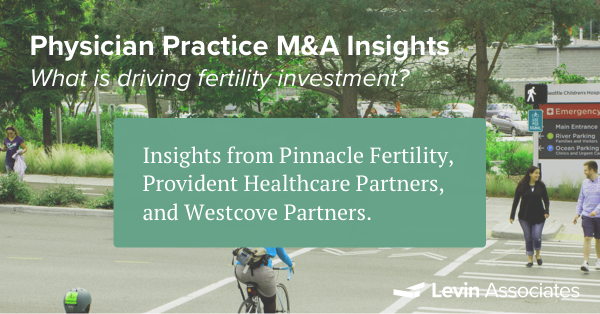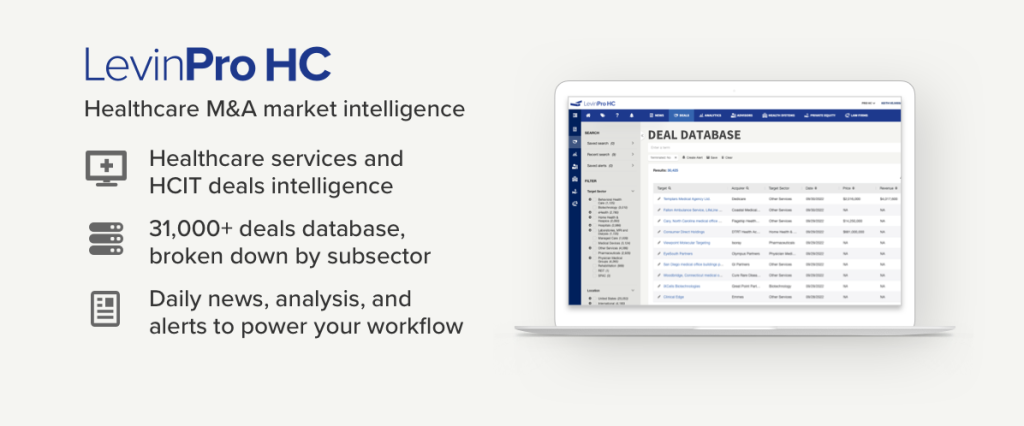
Fertility is one of the fastest-growing service lines in healthcare. Analysts agree that while valuations may dip slightly from their post-COVID highs, the sector’s growth potential over the next several years is substantial.
The fertility sector: What are we talking about?
A significant number of American couples rely on fertility services to grow their families. According to the Centers for Disease Control and Prevention’s most recent National Survey of Family Growth:
– 1 in 5 heterosexual women is unable to conceive after at least 12 months of trying
– Only 12% of women in the U.S. have ever received any infertility servicesThe U.S. Department of Health and Human Services adds that male reproductive issues account for about one-third of infertility issues.
In vitro fertilization (IVF) is the most common assisted reproductive technology (ART) used, the Mayo Clinic reports, but fertility clinicians also offer services such as:
– Hormone and genetic testing
– Ovulation medications
– Surgery to unblock fallopian tubes
– Artificial insemination“Infertility is non-discriminatory. It cuts across every wealth demographic, every race, and affects both men and women,” said Beth Zoneraich, the chief operating officer for Pinnacle Fertility. Pinnacle is an expanding fertility care platform that currently owns 10 clinics, with about 35 locations and 13 embryology laboratories.
“Fertility clinics are all about creating families and helping people who have, for whatever reason, struggled to start their family.”
Patient demand for fertility services is expected to rise.
Age can affect a couple’s chances of conceiving naturally. The American College of Obstetricians and Gynecologists notes that a woman’s fertility begins to decline after age 30, and the CDC says men over age 40 “are more likely to report difficulty conceiving.”
This is significant because Americans are having babies at older ages. The Census Bureau says the median age for giving birth in the U.S. is 30, up from age 27 in 1990. The National Health Statistics reported in January 2023 that parents having their first child over the age of 35 has “increased ninefold” since the 1970s and birth rates for women in their 40s have continued to rise.
That is part of the reason why Scott Davis, a Director at Provident Healthcare Partners, said he predicts “longer-term stability” in the fertility sector. “People are having kids at later stages. As that trend continues, which it undoubtedly will, more people will need this type of service and that creates opportunities.”
“Fertility is a sector that’s been very strong from a valuation standpoint and it’s probably one of the fastest growing service lines across healthcare,” added Abe M’Bodj, a Director at Westcove Partners. He also calls the fertility sector “more economically resilient” from an investment standpoint because “the customer who’s willing to go through, and potentially pay out-of-pocket, for several rounds of IVF is not someone that is worried about an economic downturn.”
Reimbursements helped spur M&A activity in fertility.
Levin Associates’ proprietary healthcare platform, which monitors merger and acquisition activity in real time, shows the number of announced transactions in fertility and women’s health jumped in 2022 compared to prior years. One of the factors driving investment in the space is the growing number of states requiring insurance coverage for fertility services.
The National Infertility Association reports 20 states have passed laws, each with varying requirements, mandating insurance coverage for fertility treatments.
Zoneraich called this “excellent progress,” recalling that the fertility market used to be primarily cash-driven. “Fertility treatment is expensive and I love that more patients can get access to good insurance coverage. Having a child is one of life’s greatest pleasures and people should have the ability to experience that.”
Zoneraich added, “I think private equity got into the fertility space because more and more states were getting mandated.” (Pinnacle Fertility, which is one of the largest fertility care platforms in the market, is among those backed by private equity. Pinnacle is part of Webster Equity Partners’ portfolio).
Davis echoed that sentiment. “Typically in the physician space, there’s some outside force that expedites consolidation. In this case, it was the onset of at least some amount of reimbursement for the service.”
Davis continued, “Private equity follows the money. If the volume of patients is going to be higher because a state decided to mandate insurance coverage, the dollars are going to follow.”
Another driving factor motivating investment in the space is employers adding fertility treatments to benefits packages. Large organizations including Walmart, Google, The Walt Disney Company, Starbucks and American Express are among those that offer fertility benefits. “This creates an expectation or pressure for other large employers to follow suit, in order to stay competitive,” Davis said.
Non-monetary factors are also important when closing a deal.
Levin Associates’ data platform shows how provider groups backed by private equity firms, like Pinnacle Fertility, Ivy Fertility, the Fertility Specialists Network, and Axia Women’s Health, are building larger platforms by acquiring small practices. Most of the deals involve independent practices with fewer than a dozen physicians. Many of the acquired practices are even smaller than that, including some with only one or two doctors.
Pricing for these deals is not usually disclosed to the public. The experts interviewed for this article independently stated that average valuations for fertility deals rose substantially amid the COVID-19 pandemic – reaching valuations that are comparable to those seen for cardiology and orthopedic practices.
M’Bodj said deals were closing as high as 13.0x-15.0x EBITDA for large practices and new platform opportunities. Davis also said double-digit ranges were common, and that even smaller practices were trading for high single-digit multiples of EBITDA. Zoneraich didn’t cite specific ranges but also stated that “multiples went high” and may have “peaked” in 2022.
But it’s not just about the numbers. Fertility care platforms like Pinnacle are passionate about building networks committed to providing high-quality patient care – which means they consider factors like success rates, patient satisfaction, and the reputations of the individual doctors when determining whether to acquire a smaller practice. They also work to ensure there is a desire to be a team player.
“We look for partners who are interested in the collaborative nature of this type of medicine and want to contribute to it,” Zoneraich said. “We want our physicians to work together as units across these clinics and across geographic boundaries to make the care better.”
Davis added that the quality of the practice’s laboratory is also a significant factor when deciding whether to pursue an acquisition. “Fertility is very much a lab-based model. Having a solid lab director, lab protocols, the latest equipment… that’s all important and a core piece of due diligence.”
What does the future hold for the fertility valuations?
Valuations for future M&A deals in the fertility space are expected to drop below their 2022 peaks. Davis noted this has the potential to slow consolidation activity because sellers may be less receptive to revised valuations.
Davis predicted that fertility platforms could prioritize organic growth and be “less aggressive” on the M&A front. However, he also stipulated that “it’s not a long enough period of time, where we’ve seen a cooling off, to know whether it’s a definitive trend,” Davis said. “It’s possible that the fertility space is normalizing to a more stable and consistent pace of consolidation and valuation range.”
Zoneraich also said she expects deals to close at lower price points compared to the post-COVID highs, but she disagreed about the market slowing down. She explained that in her experience, there are a lot of independent practices that are open to partnering with a larger network.
“It’s difficult to manage an independent fertility practice, and so I think many find joining forces with a bigger group, where you can have an egg bank, a surrogacy agency, access to patient financing and help with negotiating insurance and payer contracts, very appealing,” Zoneraich said.
“I expect the consolidation, which is really just in its infancy, to continue at a pretty fast clip. And I think there will be some real winners in this space as the consolidation happens.”
Erin Laviola is a writer for Levin Associates.
Levin Associates provides comprehensive coverage of the deals, companies, and trends shaping the healthcare industry. Clients access proprietary M&A transaction data and daily news/analysis through the LevinPro platform. Schedule a demo today to see what LevinPro can do for your team.
© 2023 Irving Levin Associates, LLC. All rights reserved.


